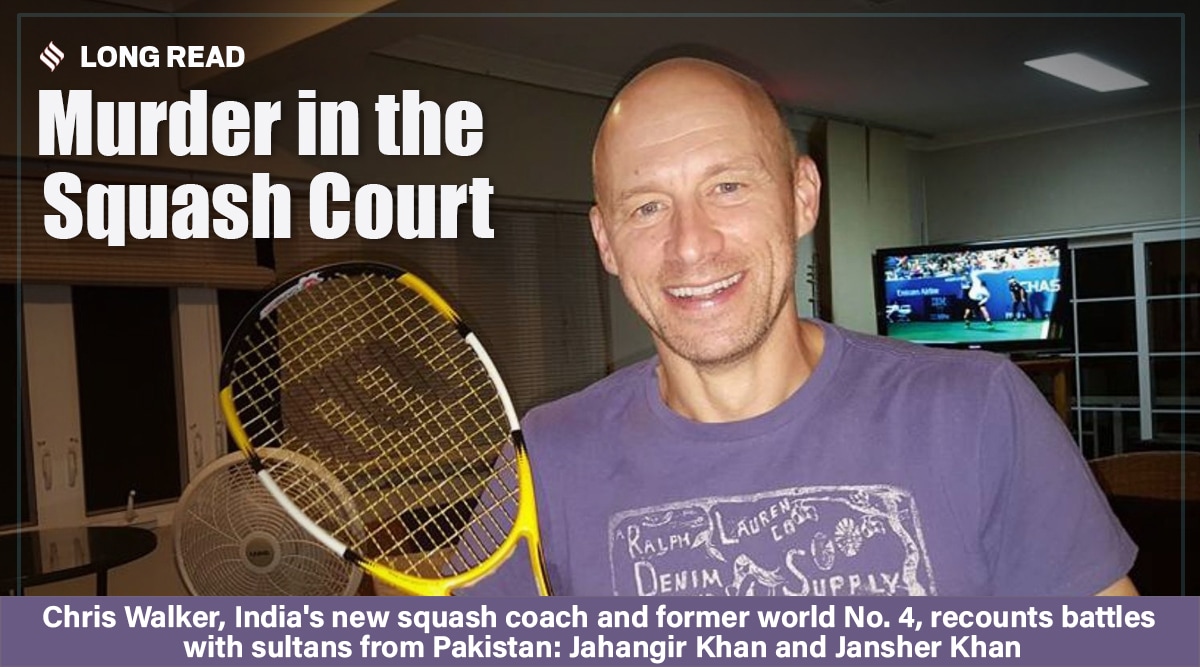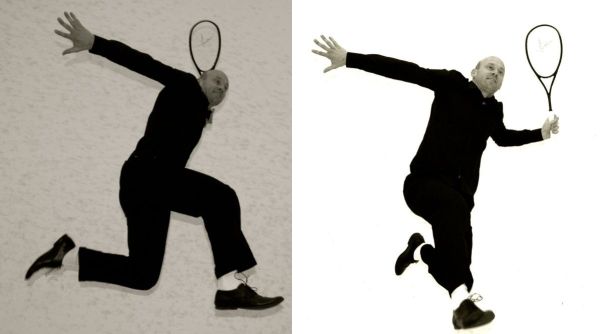 India's new squash coach Chris Walker.
India's new squash coach Chris Walker. Chris Walker, India’s new squash coach and former world no. 4, is sitting naked. A few carefully arranged squash balls save the blushes. It was for a photoshoot in the ‘80s. An ingenious idea from a photographer friend to attract potential clothing sponsors; he was UK’s No. 1 player then, and without an apparel contract. So why not strip? “It worked, I got one immediately!”
Walker is sitting on the toilet pot. The Queen of England is waiting for him in the squash court to inaugurate the tournament. When he eventually saunters out, a panicking sentry yells, “I have found him!” And asks him to rush along. “The Queen waits while Walker sat on the throne,” ran a headline in the Evening Standard the next day. Walker laughs at the memory.
He is trying his best to work around the pandemic hurdles to coach the Indians — “I have high hopes and confidence that we can do something special” — but that’s in the future. It’s his past that fascinates us for now. A long career that allowed him a close peek at the greatness of the squash sultans from Pakistan: Jahangir Khan and Jansher Khan in the end 80’s and early 90’s, and his gruelling battle against David Palmer in the 2001 British Open final which he lost after leading 2-0 that he still revisits now and then. But before we go to Birmingham 2001 for some masochism, it’s best to travel to Karachi 1993 for some awe.
The greatest squash player ever, Pakistan’s Jahangir Khan awaited him in the world cup semi-final. “Jahangir would break down the opponents — mentally and physically. All-out attack, relentless, you can feel him breathing down your neck. Nothing remained of you by the end of a match against him. You might just have won a few points in games but he would have so brutally left you gasping for breath. It was sensational,” Walker gushes.
At his pomp, over an astonishing five-and-half years, Khan never lost a match, winning a ridiculous 555 matches in a row. A miracle that people gathered around the glass walls in courts around the world to catch a glimpse. Around this time, Channel 4, a television network from the UK, sent their man to Khyber Pass in Pakistan along with Khan to retrace his story. A scene stands out. Men sit hunched around, rifles slanted on their shoulders. Uncles, neighbours, friends of Khan’s older relatives. What do they make of Khan? “Achaa hai, ab jawaan hai. Aage jaake acha khiladi banega! (Good, he is young, will become better in the future!),” says one. The documentary host convulses into a gobsmacked-laughter, a gentle grin stretches out from Khan’s lips. No wonder, he racked up 555 triumphs; they don’t get easily swayed in the mountains.
But in ’93, the reporting grapevine those days was that Khansaab had come out of retirement to play in the tournament. “I am playing 60% for the crowds here,” Khan would say ahead of the game. Walker had played him a few times before, lost all, but was faster; at 26, three years younger than Khan; and thought it might be his great chance, yet. Plus, the Karachi court was a “dead” one, and “it suited me, I thought”. Khan was up and away in a flurry though Walker would win one game and it was 1-2.
“The court was dead and I thought now my better fitness would prove to be the difference.” But the balls went a bit limp, soft, after 45 minutes of Khan pummelling them, life slowly ebbing away from them. “Now, there wasn’t much bounce. That threw me off. But Jahangir went all out with his shots. I don’t know how he did, but he did. It was hard to get the ball back at times. He played so many shots.” It was over in a blink, Walker run ragged, but his pride was intact. “I once read a book by my squash hero Jonah Barrington, ‘Murder in the Squash Court – The Only Way to Win’, on my way to a tournament and carried away by the sheer bloodymindedness described in the book, I won that tournament. Jonah is of course right. It’s a bloody gruelling sport, you do get murdered. Khan did me in, all right!”
The most bruising loss though, the one that he still revisits in his life every now and then with a wince, is the 2001 loss in the British Open final against David Palmer. He was leading 2 games to love, but would run out of gas to lose the next three. “I still think about it. British Open was my childhood dream; it was the trophy I so wanted.” Still, it was a miraculous run that year. Unsure about his future, he had taken time away from the sport, choosing to travel around the world for six months.
“The love for the game was back at the end of the trip and I began training. I had to go through the qualifying rounds also that year to make it to the main draw. I had a couple of draining five-sets in the tournament and I guess I was finished physically by the final.” It was pretty visible in the match. For the first two games, he was all over Palmer, mixing his drop shots, volleys, pace-and-cross-court-angle changes but once the fatigue set in and Palmer started to run him down, the match began to slip away.
Considering that he was evaluating his career just a year before the tournament, it was an astonishing accomplishment. “Still, I was leading 2-0 …” There is a pause in the WhatsApp call and it isn’t due to the internet buffering. The question blurts out, “Are you still haunted by it?” Walker refutes but admits it does rankle him. “But I did play and beat Palmer in a match next year. So, that was a nice feeling, I had had my revenge. And I know I was good enough to win that British Open if not for the body.” Murder on the squash court, but memories live on.
“The funny thing is that immediately after the loss, one of the first persons I spoke to after I stepped off the court was Jahangir Khan, who had retired of course but was there. And what does he tell me? ‘Chris! Why didn’t you play more shots?! Ha ha ha! Thank you Jahangir, you should have shouted that at me in the middle of the match. Why didn’t I play more shots, indeed?! Crazy times. Loved those years.”
Squash isn’t easy on the body. Forget playing it, even watching it makes one wince. Crouching bodies contorting in obtuse angles; blinding turns; hands, legs, and heads yanked in all directions in claustrophobic glassed walls — “What’s not to love?!” Walker laughs at that observation. Walker has had both his hips replaced a couple of years ago. Jansher Khan had multiple back surgeries last year. Jahangir Khan’s brother’s heart stopped on the court, mid-game. “It is indeed a physically gruelling sport – and yet such artistry, skill is involved.” That it is.
Jahangir Khan’s elder brother died on the court, the heart stopped. Jansher Khan, another great squash player from Pakistan who led 19-18 in personal battles with Jahangir, had multiple back surgeries last year. Walker himself has had both his hips replaced a couple of years ago. “You have to be supremely fit.” Like Jahangir, but what else set apart the champion from Pakistan that allowed him to win the British Open 10 times between 1982-93 and be a six-time world champion?
“Jahangir was always relentless with power and ability to hit the ball so crisply. And he would get on the ball so early — literally breaking you down and leaving you with nowhere to hide. You will fall apart by the end of a game against him. That’s what he did time and time again and people couldn’t deal with it. No wonder, it took five-and-half years for anyone to beat him.”
Jahangir’s career would be forever hyphenated with Jansher Khan, in the minds of fans of a certain vintage, and Walker breaks down how Jansher beat Jahangir.
“So at some point came Jansher trying to figure out how to bell the cat and make a name for himself. He doesn’t have the physical presence of Jahangir, so he wasn’t going to win the pace and power game. So he has to figure out how the hell to tire out this guy, how to make him vulnerable enough to get some points and win a match.
 India’s new squash coach Chris Walker.
India’s new squash coach Chris Walker. “Jansher’s philosophy was that ‘I am going to keep Jahangir on the court for an hour and half to get him at least tired enough to play a game of squash against him! Until then, he is going to absorb the pressure for an hour, get incredibly efficient for an hour and a half before he can start applying his skills. Which he obviously had as he is a great player; he has shots, strategies but none of that is going to work for the first hour and half against Jahangir!” Walker chuckles. “So you got two totally different players. He had to develop this strategy purely to outplay Jahangir. The rest of the players can beat normally and beat at their own game.”
Time to get into the hot seat. Jahangir or Jansher? “I have to say Jahangir by a tiny margin because he was unbeatable for five-and-half years – that’s unf******believable! Jansher had total belief in himself in how he was going to beat Jahangir and you had to be mentally tough for him to start doing that. At his pomp, Jahangir’s game was something else. You didn’t go into games against Jansher with an apprehension that he is going to break you down. Jahangir could and regularly did.”
Such was Jahangir’s reputation that professionals would book flight tickets when they learned they were slotted to play him in the third round. “They would book their flights for the next day. Ridiculous, really. I would always book at the end of the tournament. If I lose, hang on, watch and learn. What message are you giving your own mind if you accept loss like that?”
Jahangir might have asked questions of his opponents that they had no answer but the question that totally stumped Walker came from the Queen. That day when he made her wait. “Well, not entirely true. She was late and it was then that I rushed to the toilet! Once I greet her – and I was advised not to shake her hand but just bow, she has a look at the glass court behind me, and goes, ‘Have you played in one of these before?!’ I say, ‘actually yeah, we use these portable glass courts all over the world.’ And she goes, “Oh good! So you have had some practice. Good luck!”
- The Indian Express website has been rated GREEN for its credibility and trustworthiness by Newsguard, a global service that rates news sources for their journalistic standards.

